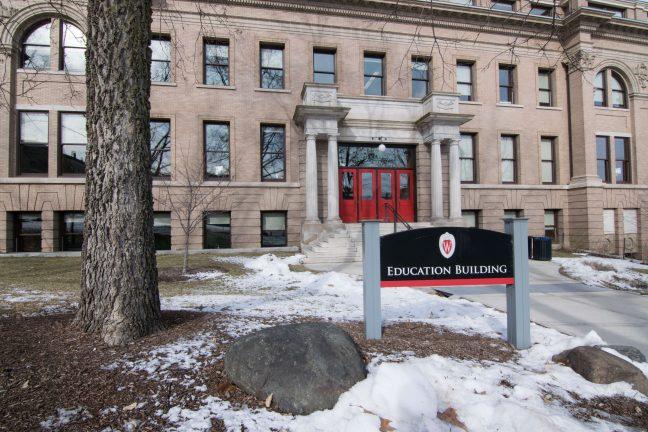The University of Wisconsin announced Tuesday the winners of the 2020 Distinguished Teaching Awards.
According to a UW News release, these awards honor the commitment of instructors, across colleges and disciplines, to teaching.
For Gender and Women’s Studies professor and award-winner Christine Garlough, teaching is all about the students. Garlough teaches both introductory and upper-level GWS classes, and she said she’s continually impressed with her students’ curiosity.
“We have absolutely fantastic students — I mean, that is one of the reasons I enjoy teaching so much,” Garlough said. “We’ve got students that are really committed to many of the issues that we talked about that have to do with oppressive systems and structures and institutions. They’re really interested in real world problems, and solving real world problems.”
Garlough said what’s paramount to her teaching is maintaining a sense of care in the classroom, where people can share differing opinions without harming or triggering others. Doing so allows for deeper, more insightful discussions, Garlough said.
Crumbling foundations: Declining enrollment numbers loom over under-funded humanities departments
Communication Arts professor and award-winner Lori Kido Lopez said in an email to The Herald that for her, bringing social justice and activism into the classroom has made for deeper student interest and expertise with hard topics such as racism.
“I love facilitating discussions with my students — they are always surprising me and it is so fun to hear what is on their minds,” Lopez said. “It is also really satisfying to make a plan for how their understanding of concepts will grow and evolve over the semester, and then to see that learning actually taking place.”
English professor and award-winner Ramzi Fawaz said he hopes to inspire confidence in his students so they feel empowered to use their voices and speak up about difficult issues. Fawaz said by speaking passionately in the classroom, he likes to show students it’s okay to be loud and take up space.
Fawaz said he tries to learn how his students think, so he can provide them with the context they need to make their own meaning of the material he teaches.
“I do think that I feel an increasing responsibility, especially as we enter an election semester, to just think critically about how I can teach my students to feel like informed citizens,” Fawaz said. “I want them to feel like people who actually have a stake in the world that we collectively live in, and how they want to move forward, how they want to proceed.”
Environmental Engineering professor and winner of the Excellence in Community-Based Learning Teaching Award Andrea Hicks said in an email to The Herald that her students’ curiosity both enhances her classes and challenges her.
Hicks teaches a course where students get to work on real-world, community-based sustainability projects through the UniverCITY Year program. She said the award, to her, reiterates UW’s commitment to community-based education.
“I appreciate that I have the ability to make a difference, not just for my students, but beyond,” Hicks said. “I very firmly believe in the Wisconsin Idea, that the university and the work we do should have a positive impact beyond the geographic bounds of the university.”
Curriculum and Instruction professor and winner of the Van Hise Outreach Teaching Award Kate Vieira said the Wisconsin Idea has allowed her instruction to reach others outside of the university. Vieira conducts peace-focused writing workshops in Colombia.
Vieira said she’s even seen her students take the Wisconsin Idea and run with it, to conduct community-based writing projects and other outreach projects.
UW delves into contemporary issues in 2020-21 Go Big Read Book
“The other thing about the Wisconsin Idea is that students take it seriously too,” Vieira said. “I think, really, that the community-university connection is key.”
Classical Studies professor William Brockliss conducts outreach with Wisconsin Latin teachers, and has helped develop an undergraduate program for students interested in becoming Latin teachers.
Brockliss said he tries to facilitate discussion in the classroom about the big concepts he teaches. He said often, his students bring new perspectives to the table and he gets to learn with them.
“The students are fresh and their perspectives are fresh,” Brockliss said. “So that’s, in fact, exhilarating for me.”
History professor and award-winner Jennifer Ratner-Rosenhagen said she loves the opportunity to get creative in the classroom and with her curriculum. Ratner-Rosenhagen teaches intellectual history, and some of her past classes have included “The History of Your Parents’ Generation,” “The History of the Seven Deadly Sins” and “The History of Spirituality.” These classes have allowed her to engage students with history in deep and special ways, Ratner-Rosenhagen said.
History class connects students with the story of their parent’s generations
UW offering instructors the space and resources to experiment with their curricula helps Ratner-Rosenhagen figure out what topics students really connect with, she said.
“You know, what’s great about Madison is you can just lean in to some aspect of your research, and then really try to amplify it and think about it as a course,” Ratner-Rosenhagen said. “[This award] makes me just want to keep upping my game.”
Curriculum and Instruction professor and award-winner Erica Halverson started out teaching elementary students art at a nonprofit, though now she teaches future elementary teachers how to use art in the classroom and she also studies research methodologies, which she teaches about to graduate students.
Halverson said she firmly believes there’s no single right way to teach, even though as an educator, people often expect a one-size-fits-all answer to engaging students in the classroom.
“I just don’t really fundamentally believe that there is a single answer to how you work effectively with students in any given circumstance,” Halverson said. “The most important part of good teaching is adaptability, improv and the ability to improvise, when you can read the circumstances.”


















